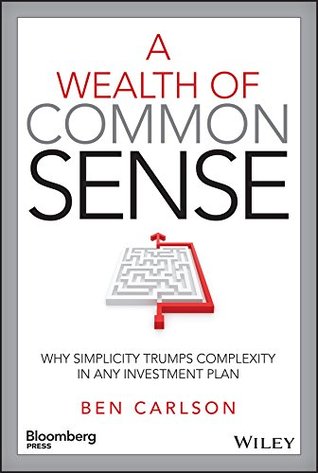A Wealth of Common Sense Summary

4 min read ⌚
 Why Simplicity Trumps Complexity in Any Investment Plan
Why Simplicity Trumps Complexity in Any Investment Plan
Let’s face it: as far as most people are concerned, the simpler a plan is, the less credible it seems. However, most of the algorithms of life are fairly simple. And, according to Ben Carlson, the same holds true for investing.
Hence, if you want to be the next Warren Buffett, what you need is not some complex strategy, but “A Wealth of Common Sense.”
About Ben Carlson
 Ben Carlson is a chartered financial analyst (CFA) and the Director of Institutional Asset Management at Ritholtz Wealth Management.
Ben Carlson is a chartered financial analyst (CFA) and the Director of Institutional Asset Management at Ritholtz Wealth Management.
He has written two books so far, the second of which is “Organizational Alpha.”
You can read more from him at http://awealthofcommonsense.com/.
“A Wealth of Common Sense Summary”
For some reason, we tend to give complex ideas unwarranted credibility.
Why?
Because, simply put, if it’s simple, then the obvious question is “why everybody doesn’t do it?” Just think of Monty Python’s “Meaning of Life.” When at the end of the film, they finally reveal what it is, we learn that it’s nothing very special.
But, how could it be? So many books and millions and millions of pages have been written to uncover it. So, how can it be so simple?
Well, why shouldn’t it be? Who says that it has to be complex?
The same applies to investing too.
You may have heard of many complex strategies on how to get rich (usually, in fairly short period of time), but the simple fact is that most of them are either for already rich people or work from time to time because of luck.
Because, every investor is different and, consequently, every investing strategy should be different as well.
Consequently, don’t expect Ben Carlson to put yours down in writing. In fact, he states clearly that any investment strategy should begin with a personality test – and he can’t make that one for you. However, expect him to give you few common-sense advices which will be applicable in any case.
First of all – the three don’ts.
And the most important among them: never – ever – enter the world of investing with an expectation to get rich in a relatively short time. The simple fact is – that almost never happens. There’s no such formula, no shortcut to instant success.
Don’t believe anyone who tells you anything differently.
Secondly, don’t be overconfident! We can’t predict the future, and the same is true for the markets. The intelligent investor knows this and tries to find a safe strategy which will make him as independent from market fluctuations as possible.
And the third “don’t”: don’t follow the herd. If everybody does something – it’s probably the wrong thing. Because, then, everybody would have been rich, wouldn’t it?
Now, that we summed up the three don’ts of common sense investing, let’s have a look at the three dos.
First of all – be emotionally intelligent. High IQ has nothing to do with being a good investor. Managing your feelings does.
Which brings us to our second point: stay calm and invest. The reason why some people can perform well under pressure is that, unlike you, they are still rational even then.
Finally, be wary. Or, as Warren Buffett would say – don’t invest what you don’t understand. No matter how tempting it looks like: see don’t #3 for that.
Key Lessons from “A Wealth of Common Sense”
1. Want to Invest? Take a Personality Test!
2. The Three Don’ts of Investing
3. The Three Dos of Investing
Want to Invest? Take a Personality Test!
If you want to invest, you shouldn’t forget two general truths. First of all, every investor is a story in itself. And secondly and consequently, that there can’t be one applicable-in-all-situations investment strategy.
So, before embarking on your investment adventure, a good common-sense idea may be to take a personality test. So, you can find out whether you’re a trend follower, risk taker, short-term trader or what-not?
Then, develop your strategy accordingly.
The Three Don’ts of Investing
However, no matter which strategy you choose, there are three common-sense don’ts of investing you must take into consideration.
First of all, don’t expect to get rich in a short period of time. Because, that will almost certainly not happen. Secondly, don’t be overconfident. Because, nobody knows what will happen on the market. And, finally, never follow the majority. They are probably wrong.
The Three Dos of Investing
Of course, there are three common-sense dos as well. And these are even simpler and as important to follow.
Firstly, be emotionally intelligent and try to manage your feelings well. Secondly, stay calm and don’t stress out when the stocks (inevitably) fail. Finally, be wary: don’t invest in anything you don’t understand.
Like this summary? We’d like to invite you to download our free 12 min app, for more amazing summaries and audiobooks.
“A Wealth of Common Sense” Quotes
It’s amazing how easy it is to do worse by trying to do better. Share on X Investing doesn’t have to be about beating others or beating the market. It’s about not beating yourself. Share on X One you start to take the market’s movements personally you’ve already lost. Share on X Only invest in active strategies or factor tilts if you are prepared to do worse for the possibility of doing better. Share on X Diversification is the best way to admit you have no idea what’s going to happen in the future. Share on X







